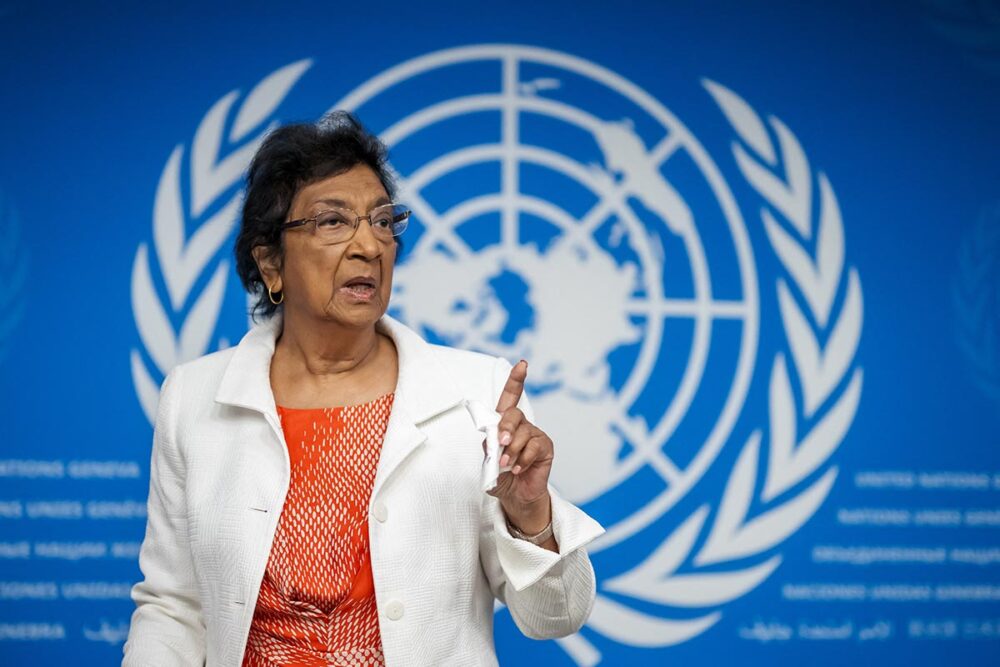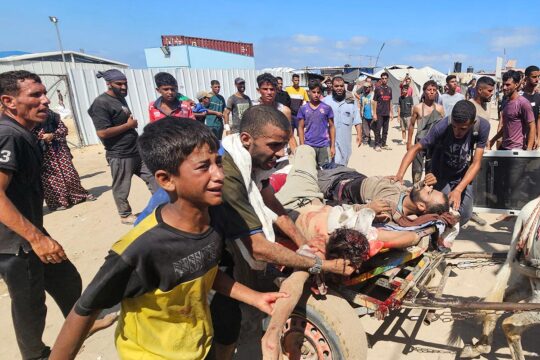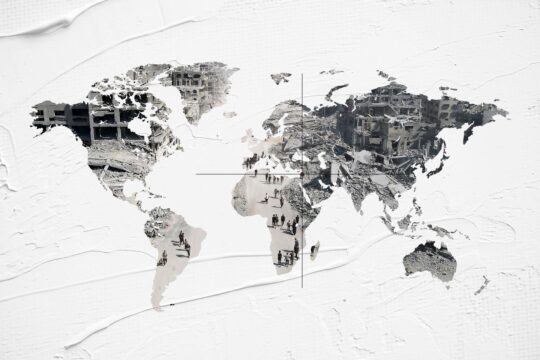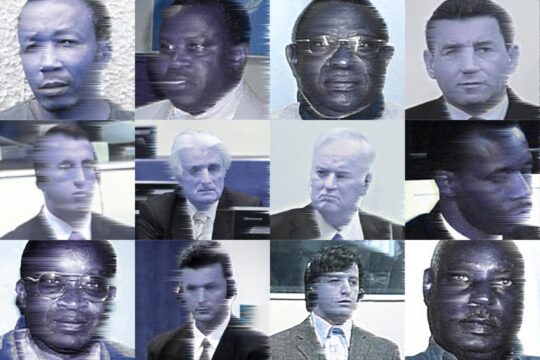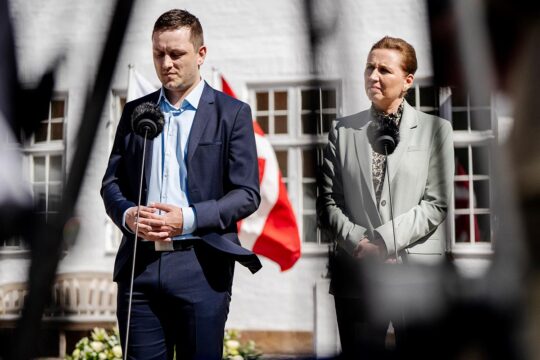On September 16 Israel launched its destroying war on Gaza city, resulting in mass displacement, hundreds of injuries and deaths and widespread destruction of homes. On the same day the UN Human Rights Council’s Independent International Commission of Inquiry stated officially for the first time that Israel’s acts meet the legal definition of genocide.
The UN Commission has assessed Israel’s responsibility for violations of the Genocide Convention from both a fact-finding and legal perspective. It has concluded that Israel’s conduct in Gaza satisfies the legal definition of genocide under the 1948 Genocide Convention, fulfilling both the physical acts and the mental intent elements.
It found that Israel has committed acts prohibited by the Convention: killing of Palestinians in Gaza, infliction of serious bodily and mental harm, the creation of conditions of life calculated to bring about the physical destruction of Palestinians of Gaza, and the imposition of measures intended to prevent birth. Crucially, the Commission determined that these acts were carried out with the specific intent to destroy Palestinians in Gaza, in whole or in part — the core requirement that distinguishes genocide from other international crimes.
Establishing intent
As for its method, the UN Commission considers that genocidal intent can be established either through direct evidence such as statements expressing an intent to destroy, in whole or in part, the protected group or/and by inference from circumstantial evidence, considering the totality of facts and patterns of conduct. While certain acts may have alternative explanations (such as military objectives), this does not preclude the existence of a genocidal intent, if it is the only reasonable inference to be drawn.
In its assessment, the Commission reviewed the actions of Israeli leaders and soldiers; the broader context; the scale and methods of harm; the number of victims; the systematic targeting of people based on group membership; the repetition of destructive acts; and the use of derogatory language. It noted that crimes against children can indicate genocidal intent. This reflect also a position that was taken a few weeks after October 7, 2023 by Canada, Denmark, France, the UK, Germany and The Netherlands in their pleadings before the International Court of Justice (ICJ) in the Myanmar case: “Given the significance of children to the survival of all groups, evidence of harm to children may contribute to an inference that the perpetrators intended to destroy a substantial part of the protected group.”
The Commission concluded that the mass killings, serious harm, and lack of accountability reflect a consistent pattern showing intent to destroy Palestinians in Gaza as a group. This intent is evidenced by official statements by Israel leaders and by their acts, including using starvation tactics, blocking humanitarian aid, and the systematic destruction of religious, cultural, and educational sites. The dismantling of Gaza’s healthcare system — combined with the denial of medical access and continued attacks on civilians — was found to deliberately undermine Palestinians’ ability to survive and recover. The systematic targeting of children was identified as part of a strategy to eliminate the biological continuity and future of the Palestinian group in Gaza.
It also established the “direct and public incitement to commit genocide”, based on statements by Israeli President Isaac Herzog, Prime Minister Benjamin Netanyahu and then Defence Minister Yoav Gallant. While it has not fully assessed statements by other leaders, including Minister for National Security Itamar Ben-Gvir and Minister for Finance Bezalel Smotrich, it considered that in the future they too should be assessed.
A warning on arms transfers
By affirming the presence of genocidal intent, the Commission’s findings significantly escalate the international legal and political implications of Israel’s war on Gaza, increasing pressure on states to intervene — particularly in relation to arms transfers. One direct legal consequence is the obligation of third states to “cease the transfer of arms and other equipment or items, including jet fuel” if it could aid the commission of genocide. This recommendation is especially notable considering a 2021 ruling by France’s Supreme Criminal Court against cement company Lafarge, which held that corporations selling arms may be deemed complicit in international crimes if they were aware those crimes were being committed — regardless of whether they shared the intent to commit them. In the present context, the Commission’s findings make it impossible for states or corporations to claim ignorance of the commission of genocide in Gaza.
This UN fact-finding report is part of a broader legal framework in which the ICJ is examining Israel's responsibility in a case brought by South Africa in late 2023, with proceedings still ongoing. The UN Report could be submitted by South Africa to the ICJ as part of its fact-finding process. However, the UN report does not address individual criminal responsibility, which falls under the jurisdiction of the International Criminal Court (ICC). The ICC is currently conducting investigations into individuals, not the state, and has already issued arrest warrants for alleged crimes against humanity against two members of the Israeli government, Prime Minister Benjamin Netanyahu and former Minister of Defense Yoav Gallant. In retaliation, US President Donald Trump was reportedly considering imposing sanctions on the ICC altogether. While the legal definition of genocide remains consistent, the focus of the UN report is on state responsibility (see also the report of the Special Rapporteur on the Situation of Human Rights in the Palestinian Territories Occupied published in July 2024).
What academics can and should say
An appeal signed, as of today, by more than 270 leading law professors from around world on the question of genocide in Gaza was initiated by French professors and published this summer in the French newspaper Libération. It outlined “eight essential observations” on which these law professors agreed, including the view that the genocidal intention of the Israeli government has crystalized. The appeal also emphasized that debates over the classification of genocide should not overshadow the fact that extremely serious crimes are committed and that there exists no hierarchy, in international law, between genocide, crimes against humanity and war crimes.
In France, publicly stating that genocide is occurring is often perceived as “taking a side” — promoting (if not aligning with) Hamas’s political agenda of destroying the State of Israel, or as being ‘antisemitism’ toward French Jews. The discourse thus forces a binary choice of picking a camp. Yet there is not opposition between standing out against a genocide while also recognizing Israel’s fear and needs. On the contrary, standing against genocide open the possibility of thinking differently Israelis’ security. Unlike what Hamas and Netanyahu’s extreme right government are telling us, there is space for both narratives, as there is space for all on this land. Refusing the binary discourse and frames is a necessary step for a fundamental convergence for stopping the genocide.

Sharon Weill is a professor of international law at the American University of Paris and also teaches at Sciences Po Paris. Her research focuses on the relationship between law, conflict and judges. She is the author of The Role of National Courts in Applying International Humanitarian Law (Oxford University Press, 2014), co-editor of Prosecuting the President – The Trial of Hissène Habré (Oxford University Press, 2020) and will soon publish Terror on Trial: an Ethnography of French Court (Cambridge University Press).
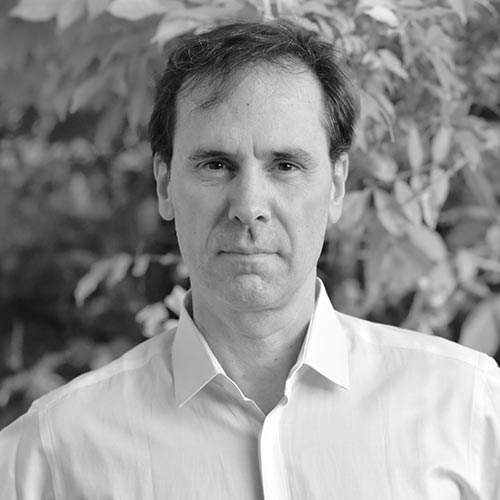
Olivier de Frouville is a professor of international law at Paris-Panthéon-Assas University and Director of the Paris Human Rights Center (CRDH). He is the author or editor of numerous books and articles in the field of human rights, international criminal law and the theory of public international law. He is also a member and former president (2023-2025) of the United Nations Committee on Enforced Disappearances and has been a member of the UN Human Rights Committee (2015-2019) and of the UN Working Group on Enforced Disappearances (2008-2014).


